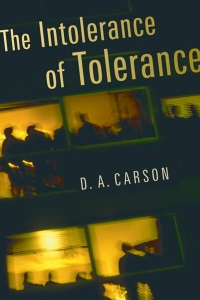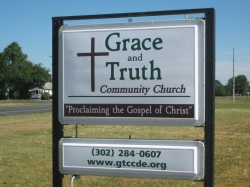A bit of a discussion, turned into debate, has been ratcheting up in evangelical and Reformed circles over the last year or so regarding the doctrine of sanctification. Specifically, the confusion is over the doctrine of sanctification and its relationship to the doctrine of justification. This is happening at both the popular and the academic level. For those interested in the discussion at an academic level, listen to the discussion / debate between Michael Horton (Westminster Seminary, California) and Lane Tipton (Westminster Theological Seminary).
There are lots of issues involved in the current debate about sanctification and none of them are new. Some of the questions that arise are: How do we use the law? How do we preach the gospel? What is grace? What are God-honoring motivations for obedience? What does it mean to be Christ-centered / Gospel – centered? Can we expect people to make any real and marked spiritual progress in life? Many more questions could be added that are directly and indirectly involved in this discussion. And I certainly won’t answer all of those questions here. But one important aspect of this debate can be highlighted in a couple quotes that are taken from Tullian Tchividjian in his book “Jesus + Nothing = Everything,” where it is claimed that “Sanctification is the daily hard work of going back to the reality of our justification” (p. 95). Again he says, “Sanctification is the hard work of giving up our efforts at self-justification” (p. 172).
Left by itself, this is wrong.
And yet, these statements are only wrong because of one word… the word “the.” If I can put it this way, these statements are not wrong because they are something other than the truth. They are wrong because they are something less than the truth. Sanctification is more than “the art of getting used to your justification” “or “going back to your justification.”
Tullian says many good things in his book which awaken the Christian to fresh appreciations of the grace that is ours in the gospel. Amen to that! After all, it is quite true and critically important that Christians know that their sanctification is in Christ and from Christ, not in themselves or merely in their own works of trying harder to be godly (1 Cor. 1:30-31; Gal. 3:1-6). It is also true that sanctification is entirely by grace. Our sanctification does not stand as a testimony to our own righteousness. It does truly stand as a testimony of the ongoing significance of what God has done for us in Christ.
But….there is something seriously defective with our understanding of sanctification if there is nothing added to this. Christians have now been joined to Christ and are therefore now living their lives as new creations (2 Cor. 5:17), who are now God’s workmanship (Eph. 2:10), who bear fruits that are apparent to others (John 15:1-8, 16). This also is an evidence of God’s grace in our lives. A true understanding of grace recognizes with Scripture that “the grace of God has appeared…training us to renounce ungodliness and worldly passions, and to live self-controlled, upright, and godly lives in the present age” (Titus 2:11-12).
The popularity of Tchividjian’s book, however, points to the fact that the somewhat lopsided view of sanctification presented there is scratching people where they itch. I think this is true for a couple of reasons.
(1) It is true (and in many circles we don’t say it enough) that the gospel is necessary for our sanctification. We now stand in gospel “grace” (Rom. 5:1). We are to “grow in grace” (2 Pet. 3:18). We continue to come to the “throne of grace” to have our spiritual needs met (Heb. 4:16). We are still being saved by the gospel (1 Cor. 1:18). As Christians, we can heartily agree with the words of the Psalmist: “If you, O LORD, should mark iniquities, O Lord, who could stand? But with you there is forgiveness, that you may be feared” (Ps. 130:3-4). When we don’t hear this kind of thing, it leaves Christians with a dreary form of performance-based legalism that thirsts for grace (whether we know it or not). Trumpet the word of grace in a strictly law-soaked environment and many a happy saint you will see! May the church have no lack of preaching the cross and the imputed righteousness of Christ. And may thirsty saints continue to drink deeply at the same well of free grace apart from human works that we hold out to non-Christians (Is. 55:1-3). These are blessed benefits of our union with Christ.
(2) At the same time, itching ears often love to be told that there is no real hope that we will experience any genuine moral transformation over the course of our lives. And, it is quickly added, that should not cause us anxiety because grace is after all free, not based on our works. As Kevin DeYoung has commented, we hear about the liars and the thieves and the adulterers and the idolaters, and the greedy, and professing Christians say, “Oh, yeah, that is totally me, totally me!” What? Do we fail to realize that Scripture describes these people as those who will not inherit the kingdom of God (1 Cor. 6:9-10)? If that description really sums up our moral state, then, according to Paul and the rest of the New Testament, it means we are not a Christian.
There definitely has to be some sense in which we are humble about the continuing presence of sin in our lives on this side of heaven. Hiding sins is the habit of hypocrites. If any man says he has no sin he is a liar (1 John 2:4). Confessing and forsaking sins is the habit of Christians (1 John 1:9). But we also must be able to say in a good conscience that “such were some of you” (1 Cor. 6:11). To be a “new creation” (Gal. 6:15) means we are no longer what we once were. As Christians, we first experience the definitive divine action of sanctification when we are regenerated and then we are progressively sanctified throughout our Christian lives (2 Cor. 3:18; Rom. 12:1-2).
Here is a big picture perspective. God’s grace to us in our union with Christ means that we are justified in Christ, adopted in Christ, and sanctified in Christ. Theologians have called these the forensic, the filial, and the transformative aspects of our salvation. All three of these categories are essential aspects of what God does in and for a Christian through their union with Christ. It seems that some today are downplaying the second two categories of what Christ does in our salvation, while they lift the first category of justification up to the heavens. When there is an unbalanced emphasis like this, it is not an example of Christ-centered or gospel centered preaching, no matter how much they talk about Christ or his cross. It does not promote Christ-centered or gospel-centered living to reduce the doctrine of salvation to justification. We must have full gospel preaching for the long-term happiness and holiness of the church.
This is actually a reoccurring discussion in the life of the church over the centuries. An important historical precedent for today’s debate can be seen in the Marrow Controversy of the 16th century. For background on that and helpful connections with today, check out Sinclair Ferguson’s 3-part sermon

 Pastor Youcef Nadarkhani has done a very dangerous thing. He has converted from Islam to Christ. This is dangerous because he lives in Iran where such a thing violates the law of the land. He has recieved a death sentence which has been delayed in the hope that he would recant his faith.
Pastor Youcef Nadarkhani has done a very dangerous thing. He has converted from Islam to Christ. This is dangerous because he lives in Iran where such a thing violates the law of the land. He has recieved a death sentence which has been delayed in the hope that he would recant his faith.




















